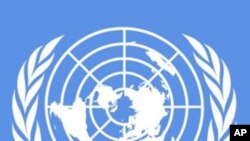The U.N. Panel on Climate Change says it will investigate claims that leading climate change scientists suppressed or manipulated data. The accusation came after emails leaked from a British university were posted on the Internet. Climate change proponents say the leak was intended to derail talks at next week's Copenhagen Conference.
The head of the United Nations International Panel on Climate Change says he will look into allegations that scientists at the University of East Anglia's Climate Research Unit in Britain may have tried to manipulate Climate Change data. Dr. Rajendra Pachauri told the BBC that the U.N. will investigate.
"We certainly don't want to brush anything under the carpet," he said. "This is a serious issue and we will look into it in detail."
A series of leaked emails from the British University appeared to refer to scientists trying to keep some research out of U.N. reports. The head of the university department says the relatively few emails have been taken out of context, but has stepped down until an internal review can be carried out.
Environmentalist and writer Jonathan Porritt says whatever the truth, it is a serious issue.
"There's clearly some irresponsibility that's been going on at the very least, and possibly worse in terms of not being transparent about the data that should be in the public domain," he said.
Philip Stott, a professor in biogeography at the University of London and a climate change skeptic, says the leaked emails call into question the whole scientific basis of the climate change argument.
"Seeing things happen doesn't necessarily give us an idea of cause, in other words, you're going to have climate change whatever happens," he said.
Stott believes there are still unanswered questions about the direct correlation between carbon dioxide emissions and global warming, and questions whether limiting emissions will do anything to help.
"There is an element of human influence on climate, unquestionably so," he said. "My worry all along has been a very simple one. In so complex a system, managing one factor at the margins will not produce a predictable outcome."
Both Stott and Porritt agree, that politicians may have the most at stake if the United Nations Climate data is called into serious question.
"There is no equivalent of this anywhere else in the world," Porritt said. "Twenty years worth of very high-powered scientists getting together, sharing knowledge, sharing data, getting things published in peer review journals, blah blah blah, this is a unique process. If we see the integrity of that process damaged, then it makes life much harder for politicians."
It is the politicians who will have to try to come to an agreement at the Copenhagen conference next week, including U.S. President Barack Obama, who will be among world leaders attending.
News
UN Panel to Investigate Claims Climate Change Scientists Suppressed Data
update

Accusation came after emails leaked from British university were posted on the Internet. Climate change proponents say leak intended to derail talks at next week's Copenhagen Conference.



